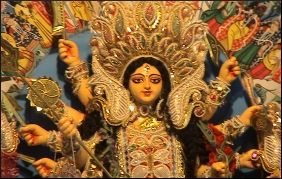|

|
Green themes abound in Durga Puja marquees
|
|

|
|
| Top Stories |
 |
|
|
|
Bappaditya Chatterjee | 15 Oct, 2018
At a time when global warming and high pollution levels have emerged as
major challenges for policy planners worldwide, a number of community
Durga Puja organisers in and around Kolkata have come up with green
themes to spread awareness about a clean environment among the public.
Children
and adults alike can enjoy the feeling of passing through a sanctuary
at "Dinosaur Park" that has been simulated with high quality light and
sound effects in Salt Lake City's FD Block marquee, while the Beliaghata
Sandhani club has protested against the killing of tigers and
underscored the need for conservation of the big cat with its "Tarjon
Garjon" (Roar of the Tiger) theme.
Delivering a message about
reusing plastics and not littering it everywhere, the "When Useless
Becomes Useful" theme finds prominence in the marquee of Kankulia and
Fern Road Community Durga Puja. Organisers of the Patuli community Durga
Puja festival, on the other hand, have showcased "Go Green with
Development" in the marquee.
Dum Dum Park Sarbojonin's marquee on
the "Ujan thele Chalo nao, Pakhira bole moder praan bachao" (Row the
boat upstream, birds are crying for their lives) theme is a telling
reminder about the species of birds which are facing extinction due to
radiation emitting from mobile towers and the destruction of their nests
due to the felling of trees.
The "Nirmal Bangla" (Clean Bengal)
project has been highlighted by the Ashwininagar Bandhu Mahal Club,
which has created a canvas using mostly nails.
Dwelling on green
themes presents a win-win scenario for organisers as they are usually
big hits with the spectators, who empathise with the marquee's concern
about environmental degradation through the themes, which also bring in
the prizes.
Ten years ago, FD Block in Salt Lake had started the
trend of promoting environment-related themes at community Puja
marquees. Since then, green theme Pujas have been gradually changing the
face of Bengal's and perhaps India's biggest carnival.
"About 10
years back, environment-based themes in community Pujas were hardly
noticed. But, the growing number of green themes over the past few years
is not only encouraging but also instrumental in developing environment
consciousness among school children and college goers," Calcutta
University's Professor of Environment Sciences Aniruddha Mukhopadhyay
said.
Mukhopadhyay, who has been following the evolution of the
environment-based themes since 2007, as a jury member of an award for
green community Pujas -- Serader Sera Nirmal Pujo Puroskar -- said
varied themes describing the menace of global warming, climate change,
pollution, crop diversity and bio-diversity, conservation of forests,
medicinal plants, the marine ecosystem and recycling of waste have made
their presence felt at marquees across the city.
Topics such as safety and disaster management have also been turned into Puja themes.
Mukhopadhyay,
however, called for the development of year-long green neighbourhood
programmes in order to extend the boundaries, instead of remaining
confined to the marquees.
"Showcasing green themes during festive
days and eco-friendly activities within the Puja premises will not be
enough. The crucial thing is how the Puja organisers are able to
transform the five-day green activities into actions for 365 days and
extend the boundaries to entire the locality to make it sabuj para
(green neighbourhood)," Mukhopadhyay told IANS.
West Bengal
Pollution Control Board Chairman Kalyan Rudra pointed out that the
flipside of such a big carnival is that colossal waste, including of
non-biodegradable material, is generated and electricity consumption
surges as thousands of lights are installed in and around the marquees
across the city during the festival days. Even trees are trimmed for
displaying hoardings and advertisements.
"It will be painful if
the Puja organisers do not pay enough attention on these issues. This
year, we are issuing an advisory to at least 200 community Pujas across
districts to create awareness for environment protection. We have also
urged the district administrations to take necessary action," Rudra told
IANS.
Artists of Kumartuli -- the city's hub of idol makers --
claim they use lead-free colour for painting the idols. Awareness about
eco-friendly colour has been developed not only among idol makers, but
also among consumers. However, mass-scale adoption of non-toxic paint is
yet to be achieved in the absence of any checks and due to a lack of
understanding of the cost-benefit analysis, said Krishnajyoti Goswami,
Professor of Biochemistry at Malaysia's Lincoln University College.
"Idol
makers are claiming that they use non-toxic paint. But who is
monitoring this? Mass-scale adoption of eco-friendly colour is yet to be
achieved. The unit price of lead-free colour is dearer compared to
traditional dust colour but consumption of eco-friendly colour is much
lower than that of the dust variety," Goswami, who has been associated
with the campaign for use of lead-free paint in idol making, said.
|
|
|
| |
|
|
|
|
|
|
|
|
|
|
|
|
|
|
| |
| Customs Exchange Rates |
| Currency |
Import |
Export |
US Dollar
|
84.35
|
82.60 |
UK Pound
|
106.35
|
102.90 |
Euro
|
92.50
|
89.35 |
| Japanese
Yen |
55.05 |
53.40 |
| As on 12 Oct, 2024 |
|
|
| Daily Poll |
 |
 |
| Do you think Indian businesses will be negatively affected by Trump's America First Policy? |
|
|
|
|
|
| Commented Stories |
 |
|
|
|
|
|
| |
|